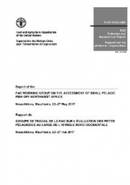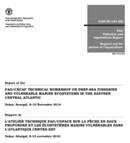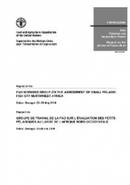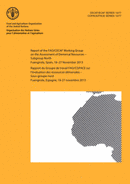Publications
Below are the most recent CECAF publications. Publications are categorized into four types:
Reports |
Technical and extra-ordinary documents |
CECAF/ECAF Series |
Serial publications |
Statutory meetings |
Regular Committee Meetings and Scientific Sub-Committee meetings |
Working group meetings |
Small Pelagic North, Small Pelagic South, Demersal Species North, Demersal Species South and Artisanal Fisheries working groups |
Recent documents
The seventeenth meeting of the FAO Working Group on the Assessment of Small Pelagic Fish off Northwest Africa was held in Nouadhibou, Mauritania, 22–27 May 2017. The Group assessed the status of the small pelagic resources in Northwest Africa and made projections on the development of the status of the stocks and on future effort and catch levels. The advice for the stocks is in general given in relation to the agreed target and limit reference points (F0.1, B0.1, FMSY, and BMSY) and on the basis of the projections for the next four or five years.
The FAO Technical Workshop on Deep-sea Fisheries and Vulnerable Marine Ecosystems of the Eastern Central Atlantic took place in Dakar, Senegal, from 8 to 10 November 2016. The meeting was attended by 32 participants who contributed in their individual capacities to the discussions on the subjects of deep-sea fisheries and benthic habitats of the CECAF region. The participants had backgrounds in fisheries management, research, environment, fishing industry, non-governmental organizations, regional organizations, and projects. Invited experts provided case studies and examples of deep-sea fisheries management and processes to protect vulnerable marine ecosystems (VMEs) from the north, western-central and south Atlantic regions. The three-day workshop was organized into two main parts, with 2.5 days dedicated to discussions on deep-sea fisheries, and VMEs in the CECAF area (Part 1), and a half-day session specifically dedicated to awareness raising on sponges (Part 2). The deep-sea fisheries and VME component of the workshop aimed to support the implementation of the FAO International Guidelines on the Management of Deep-sea Fisheries in the High Seas (adopted 2008) in the region, and to increase knowledge and share experiences of the importance of addressing potential impacts from deep-sea bottom contact fisheries on VMEs. Overviews were provided on current global and regional instruments, processes and practices for the management of deep-sea fisheries and protection of VMEs, and their relevance to the CECAF region discussed. Deep-sea fisheries in EEZs and ABNJ were characterized and current available information on benthic habitats were reviewed. This component of the workshop resulted in a suite of advice and recommendations for the CECAF Scientific Sub-Committee to consider for recommendations to the next Committee meeting. The Sponges component of the workshop addressed the objectives of Work Package 8.2 of the SponGES project “Deep-sea Sponge Grounds Ecosystems of the North Atlantic: an integrated approach towards their preservation and sustainable exploitation”, which aims to promote and facilitate dialogue and knowledge transfer between scientists, managers, policy-makers, and stakeholders from the Atlantic region on SponGES, through round-table dialogues.
The sixteenth meeting of the FAO Working Group on the Assessment of Small Pelagic Fish off Northwest Africa was held in Dakar, Senegal from 23 to 28 May 2016. The Group assessed the status of the small pelagic resources in Northwest Africa and made projections on the development of the status of the stocks and on future effort and catch levels. The advice for the stocks is in general given in relation to the agreed target and limit reference points (F0.1, B0.1, FMSY, and BMSY) and on the basis of the projections for the next four or five years. The structure of the report is in general the same as that of the previous Working Group reports (FAO, 2002–2015), but includes added information on the small pelagic fisheries in the Canary Islands. A separate section is devoted to each of the main groups of species (sardine, sardinella, horse mackerel, chub mackerel, bonga and anchovy). For each of these, standardized information is given on stock identity, fisheries, abundance indices, sampling intensity, biological data, assessment, projections, management recommendations and future research. Additional information on the different analysis and choices made by the Working Group has been included, when this was deemed necessary.
This document is the final report of the twenty-first session of the Fishery Committee for the Eastern Central Atlantic (CECAF), which was held in Dakar, Senegal, from 20 to 22 April 2016. Major topics discussed were: (i) action on recommendations of the twentieth session; (ii) main outcomes of the seventh session of the Scientific Sub-Committee; (iii) fisheries management in the CECAF region: state of implementation of fisheries management plans and adoption of management recommendations; (iv) actions taken to combat IUU fishing; (v) closure of Vulnerable Marine Ecosystems in the CECAF region; (vi) functioning of CECAF: options for improvement and collaboration with other regional and sub-regional organizations; (vii) management framework for shared small pelagic fisheries management in Northwest Africa; (viii) the potential role of RFBs in the new EAF-Nansen programme: the case of CECAF; (ix) study on the evolution of small pelagic fisheries in West Africa and the possible impact on nutrition and food security in West Africa; (x) study on scientific advice provided with respect to surplus estimation for sustainable fisheries partnership agreements; (xi) reports on recent meetings of other regional and sub-regional organizations; and (xii) the FAO Committee on Fisheries (COFI).
The overall objective of the Group is to contribute to the improvement of the management of demersal resources in Northwest Africa through assessment of the state of stocks and fisheries to ensure the best sustainable use of the resources for the benefit of coastal countries. The study zone for the Working Group is the CECAF zone of the Central-East Atlantic Ocean between Cap Spartel and the south of Senegal. Approximately twenty eight different stocks-units were analysed and the results discussed. The models provided reliable results for twenty two of them, of which ten are overexploited and twelve seem not to be fully exploited. For five stocks, the results obtained by the models from the available data were not conclusive.





